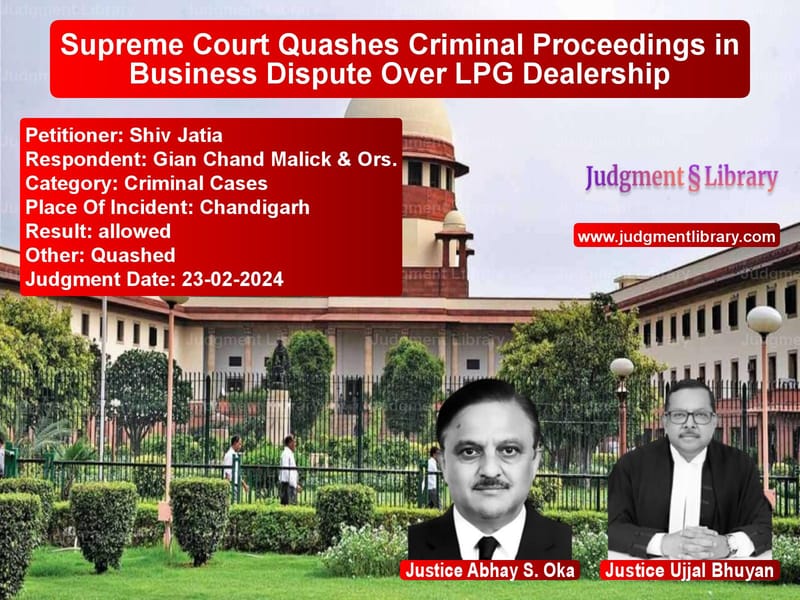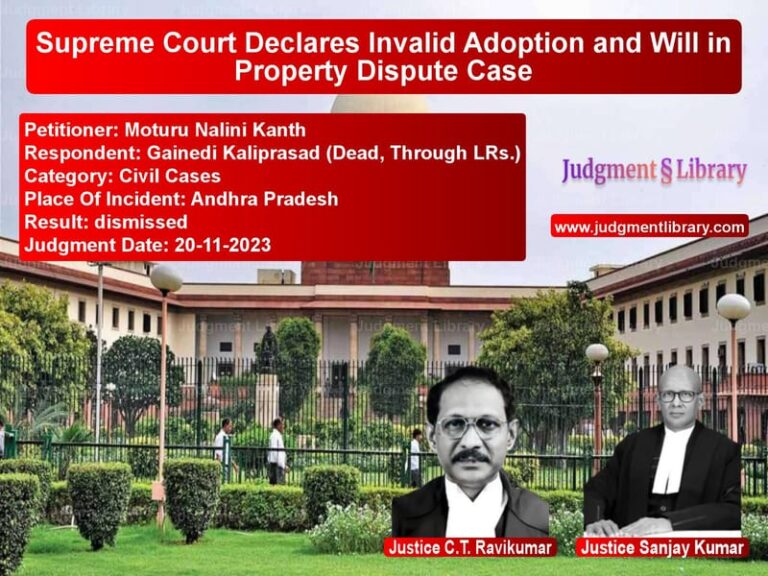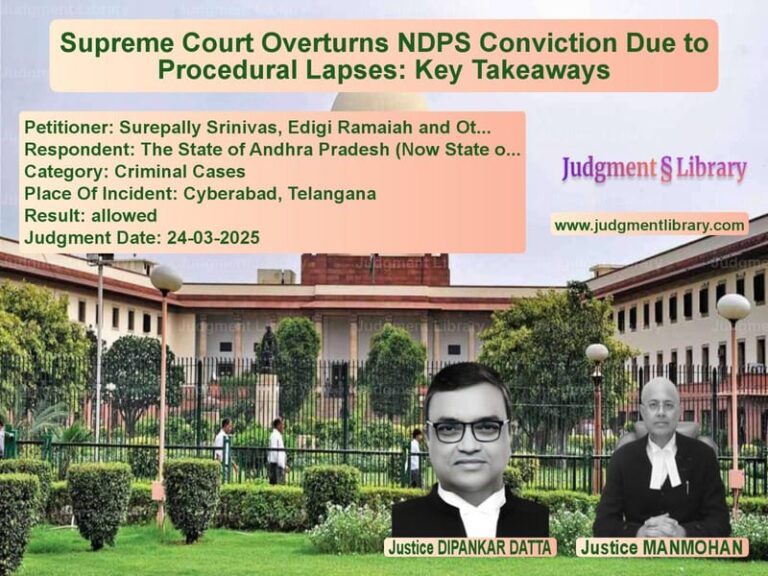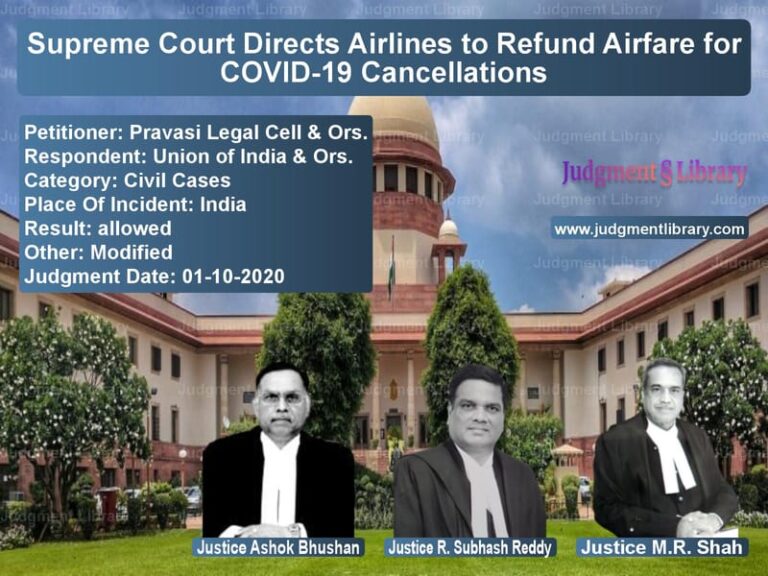Supreme Court Quashes Criminal Proceedings in Business Dispute Over LPG Dealership
The Supreme Court, in Shiv Jatia v. Gian Chand Malick & Ors., quashed criminal proceedings against the appellants in a business dispute involving an LPG dealership agreement. The Court ruled that the allegations in the complaint primarily pointed to a civil dispute rather than a criminal offense, emphasizing that criminal law should not be used to settle commercial disputes.
Background of the Case
The case arose from a private complaint filed by Gian Chand Malick under Section 200 of the Code of Criminal Procedure, 1973 (CrPC), alleging offenses under Sections 420, 406, 467, 468, and 472 read with Section 120-B of the Indian Penal Code (IPC), as well as Section 13 of the Essential Commodities Act, 1955. The complaint was based on a dispute over an LPG dealership agreement executed between the parties.
The appellants, including Shiv Jatia, were accused in their capacity as directors and officers of M/s. Energy Infrastructure (India) Limited (referred to as the accused company). The complainant alleged that the accused had fraudulently induced him into a dealership agreement, causing financial losses.
Key Allegations in the Complaint
- The accused company, through its representatives, entered into an LPG dealership agreement with Arun Sharma, who was the authorized distributor.
- Arun Sharma, in turn, executed a Point of Sale (POS) Agreement with the complainant, appointing him as a sales outlet in Dhanas for distributing LPG cylinders.
- The complainant alleged that he paid a security deposit of ₹74,900 and additional amounts for purchasing LPG cylinders but did not receive the agreed quantity of refills.
- He further claimed that the accused company failed to refund his deposit and did not accept the return of empty cylinders, leading to a breach of trust.
- It was alleged that the accused company never formally recognized the complainant’s dealership agreement, rendering it fraudulent.
Trial Court Proceedings
The Judicial Magistrate, First Class, Chandigarh, recorded statements of witnesses and documents submitted by the complainant. After examining the evidence, the Magistrate issued a summoning order on July 16, 2013, for the alleged offenses.
High Court’s Decision
The appellants moved the Punjab and Haryana High Court, seeking to quash the complaint and summoning order. However, the High Court dismissed their petition on August 25, 2014, stating that the case involved disputed facts that required a full trial.
Arguments Before the Supreme Court
Appellants’ (Accused’s) Arguments
- The complaint was a commercial dispute that did not warrant criminal prosecution.
- There was no evidence of criminal intent or misrepresentation.
- The dealership agreement was executed by Arun Sharma, who was not authorized to bind the accused company.
- The complainant had remedies under civil law but chose to pursue criminal charges to exert pressure.
- The Magistrate failed to comply with Section 202 of CrPC, which requires postponement of the summoning order for accused persons residing outside the jurisdiction.
Respondent’s (Complainant’s) Arguments
- The accused company accepted the complainant’s deposit but later denied recognizing his dealership agreement.
- The actions of the accused constituted criminal breach of trust and cheating.
- The issuance of LPG cylinders and non-refund of the deposit supported allegations of fraudulent intent.
- The Magistrate’s inquiry and recording of witness statements were sufficient to proceed with the trial.
Supreme Court’s Observations
The Bench, comprising Justices Abhay S. Oka and Ujjal Bhuyan, examined the facts and procedural lapses:
- “A commercial transaction that lacks direct evidence of fraudulent intent should not be prosecuted as a criminal offense.”
- “The failure to comply with Section 202 of CrPC is a serious procedural lapse. When the accused resides outside the jurisdiction, the Magistrate must conduct an inquiry or seek a police investigation before issuing a summoning order.”
- “The complainant’s dispute primarily involves non-fulfillment of a commercial contract, which falls under civil law remedies.”
- “The accused company’s lack of direct involvement in the execution of the POS Agreement further weakens the case for criminal liability.”
Key Legal Findings
- Failure to conduct a mandatory inquiry under Section 202 of CrPC rendered the summoning order procedurally defective.
- The dispute was civil in nature and did not establish criminal intent beyond a reasonable doubt.
- Quashing of criminal proceedings is justified when allegations fail to make out a prima facie case of cheating or fraud.
Final Judgment
The Supreme Court ruled:
“The impugned judgment of the High Court is set aside. The complaint and summoning order issued against the appellants are quashed.”
The Court clarified that the complaint could proceed against other accused individuals but not against the present appellants.
Key Takeaways from the Judgment
- Commercial disputes should be addressed through civil remedies rather than criminal prosecution.
- Compliance with Section 202 of CrPC is mandatory when accused persons reside outside the Magistrate’s jurisdiction.
- Criminal complaints must demonstrate fraudulent intent beyond contractual disagreements.
- Courts must prevent the misuse of criminal law to settle business disputes.
Impact of the Judgment
This ruling strengthens protections for businesses against frivolous criminal litigation arising from commercial disputes. The judgment will:
- Discourage abuse of criminal law for enforcing business contracts.
- Ensure stricter compliance with procedural safeguards before issuing summoning orders.
- Encourage parties to resolve commercial disputes through civil courts or arbitration.
Conclusion
The Supreme Court’s decision in Shiv Jatia v. Gian Chand Malick sets a crucial precedent against the misuse of criminal proceedings in business disputes. By quashing the complaint, the Court reaffirmed the principle that criminal law should not be weaponized for commercial enforcement. This ruling provides clarity on the legal distinction between civil and criminal liabilities in business transactions.
Petitioner Name: Shiv Jatia.Respondent Name: Gian Chand Malick & Ors..Judgment By: Justice Abhay S. Oka, Justice Ujjal Bhuyan.Place Of Incident: Chandigarh.Judgment Date: 23-02-2024.
Don’t miss out on the full details! Download the complete judgment in PDF format below and gain valuable insights instantly!
Download Judgment: shiv-jatia-vs-gian-chand-malick-&-supreme-court-of-india-judgment-dated-23-02-2024.pdf
Directly Download Judgment: Directly download this Judgment
See all petitions in Fraud and Forgery
See all petitions in Judgment by Abhay S. Oka
See all petitions in Judgment by Ujjal Bhuyan
See all petitions in allowed
See all petitions in Quashed
See all petitions in supreme court of India judgments February 2024
See all petitions in 2024 judgments
See all posts in Criminal Cases Category
See all allowed petitions in Criminal Cases Category
See all Dismissed petitions in Criminal Cases Category
See all partially allowed petitions in Criminal Cases Category







